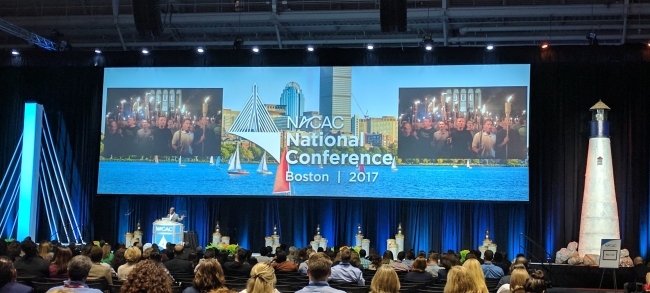You have /5 articles left.
Sign up for a free account or log in.

Shaun R. Harper confronted attendees of NACAC's National Conference with a blunt discussion of racism.
Rick Seltzer/Inside Higher Ed
BOSTON -- College admissions officers and high school guidance counselors regularly engage in racism, keynote speaker Shaun R. Harper told thousands of attendees at the National Association for College Admission Counseling's national conference Thursday, imploring them to change their ways.
“Your profession is 80 percent white,” said Harper, a professor at the University of Southern California's school of education and executive director for the university's Race and Equity Center. “It's even whiter when we get to those who are at the top levels. It sure would be nice if a mostly white professional association and its members more powerfully, more responsibly and more loudly advocated for racial justice on behalf of those who don't have the resources that they deserve in high schools across our nation.”
Harper's keynote comes weeks after white nationalists shocked the country by marching through Charlottesville, Va., the home of the University of Virginia. Days after the Virginia events, Harper addressed that university's faculty and staff members, arguing that the university is complicit in maintaining white supremacy in society and asking them to change. He wrote about the experience in an essay on Inside Higher Ed.
His NACAC speech in Boston made some similar points. Harper asked conference attendees to raise their hands if they were disgusted by the racism displayed in Virginia. Then he argued against being “selectively horrified and disgusted” by racism and its manifestations. Those manifestations include those in the college admissions process, he said.
“Racism isn't just tiki torch-carrying white nationalists,” he said. “It's not just the things Donald Trump says. It's also the things that happen in high schools and in college admissions offices.”
Harper listed numerous areas where he sees structural racism in the admissions process, drawing upon his own research visiting colleges and universities across the country to determine how young black men navigated higher education.
His list started with valuing “black lives differently” in counseling -- guidance counselors not investing as much time or energy for black students who are applying to college as they do for white students. It continued with “undermatching,” or telling students that they should not try to enroll in top colleges or universities because “kids from here don't get into schools like those,” even if those students were top performers and in all likelihood would be admitted to the country's top institutions.
Harper also spoke against telling students that historically black colleges and universities are of poor quality and against recruiting black students from only a select handful of cities and high schools. He argued that “curricular racelessness” in programs producing professionals who work in higher education is racist because it allows graduates to enter the field with implicit biases that were never challenged.
He added that racial stratification in college admissions offices is racism as well, saying top administrators are usually white while those at the bottom of the organizational chart are more likely to be people of color.
Some of his most withering criticism was targeted at the idea that colleges can't find enough college-ready, highly qualified black applicants.
“You can find them when you want them to play on the football team and the men's basketball team,” he said. “You can find them easily when you want them to earn millions of dollars for your universities. You will go to the ends of the earth to find them.”
Harper drew his presentation to a close by showing a picture of the torch-bearing marchers in Charlottesville.
The events in Charlottesville led to a loss of life, he said, referencing the death of Heather Heyer, who was killed when an Ohio man drove his car into demonstrators protesting white nationalists in Charlottesville.
But lives are also ruined when guidance counselors and admissions officers misdirect students, Harper said. Students are locked out of opportunities. They are negatively affected by counselors who say they are not smart enough.
An association as large as NACAC should be able to do something about issues like the low number of counselors serving primarily minority students in low-income communities, Harper said.
“This isn't just a one-time occurrence on a bad night in Charlottesville,” he said. “This is something that happens every day in high schools and on college campuses around the country.
“Please, do better.”
The View From Inside
The keynote came after NACAC President Nancy T. Beane laid out a host of issues in her opening remarks. The admissions profession faces challenges related to degree completion, economic disparity, student debt, mental health and systemic inequalities in the college admission process, she said.
Meanwhile, NACAC has had to weigh in after President Trump's administration took new positions on highly charged issues, such as when it moved to end the Deferred Action for Childhood Arrivals program and introduced an immigration ban targeting nationals of six Muslim-majority countries. NACAC is attempting to draw a line between addressing those issues and taking political stances.
“We have taken strong positions and issued statements,” said Beane, associate director of college counseling at the Westminster Schools in Georgia. “I hope you understand this: they are honestly not political but are rather aimed at protecting students, just as we always have done since NACAC was established.”
This is not the first time the issue of race has been prominent at a NACAC conference. Last year, the outgoing president, Phillip Trout, faced sharp criticism after saying “all lives matter” during the conference's opening general session.
His statement upset many who felt saying “all lives matter” amounted to minimizing the Black Lives Matter movement and its message against police killings of black men and women. Trout apologized.








